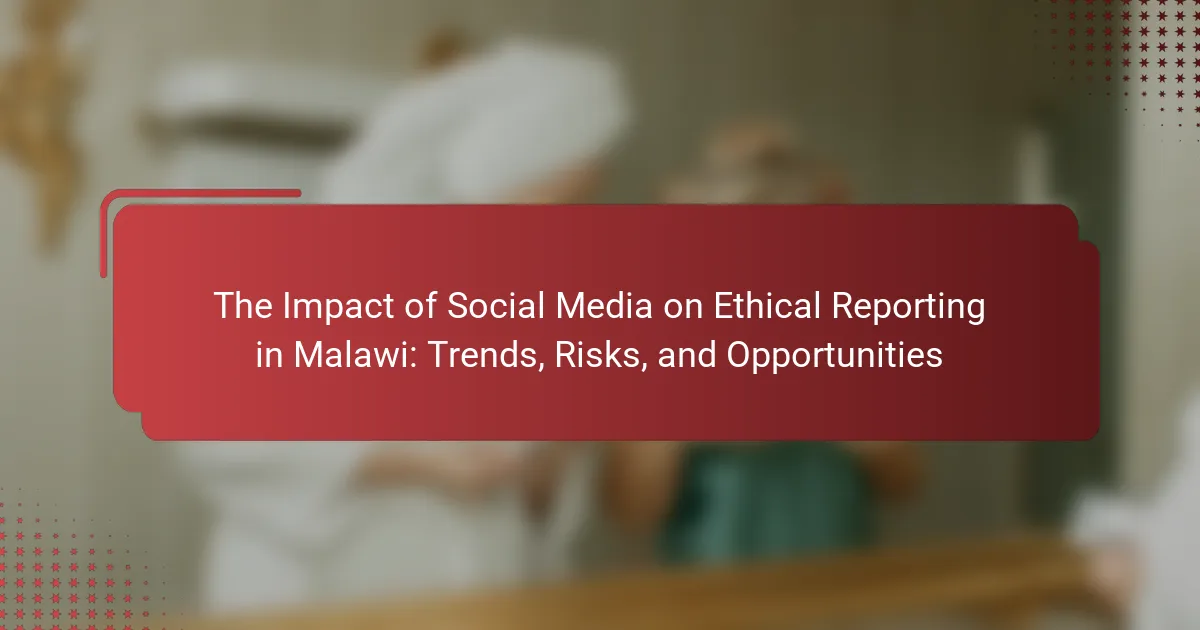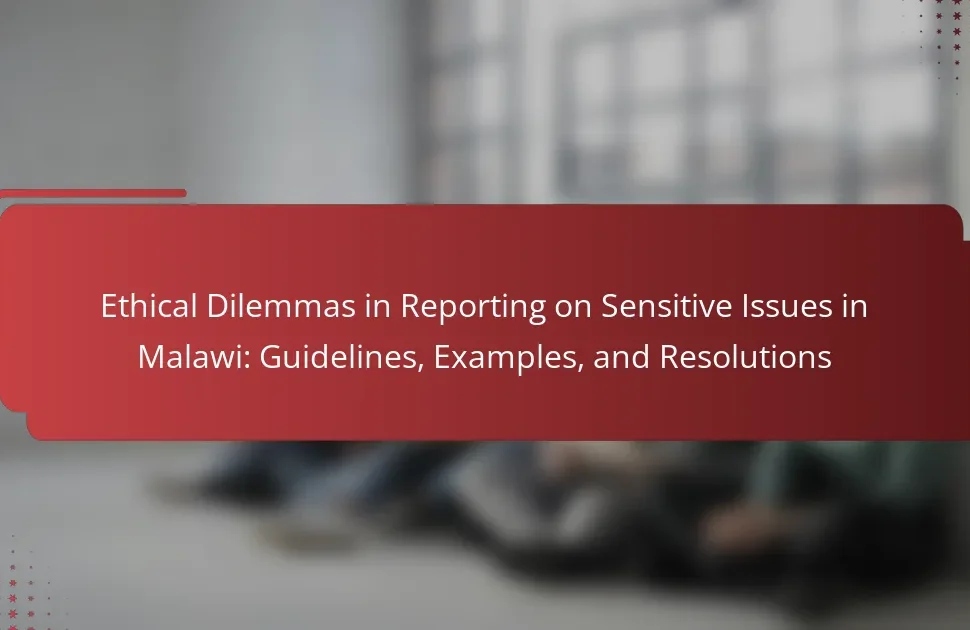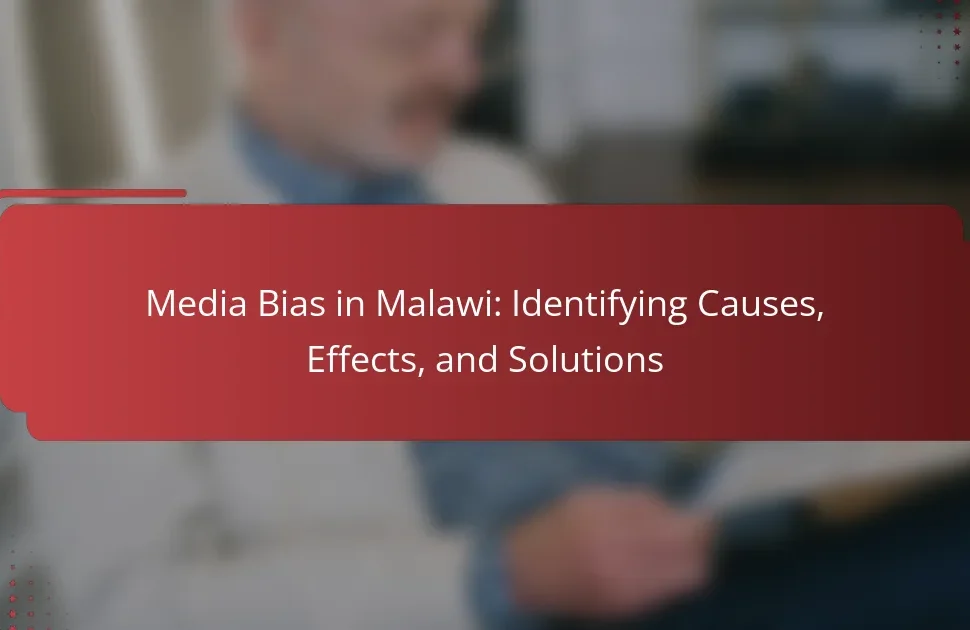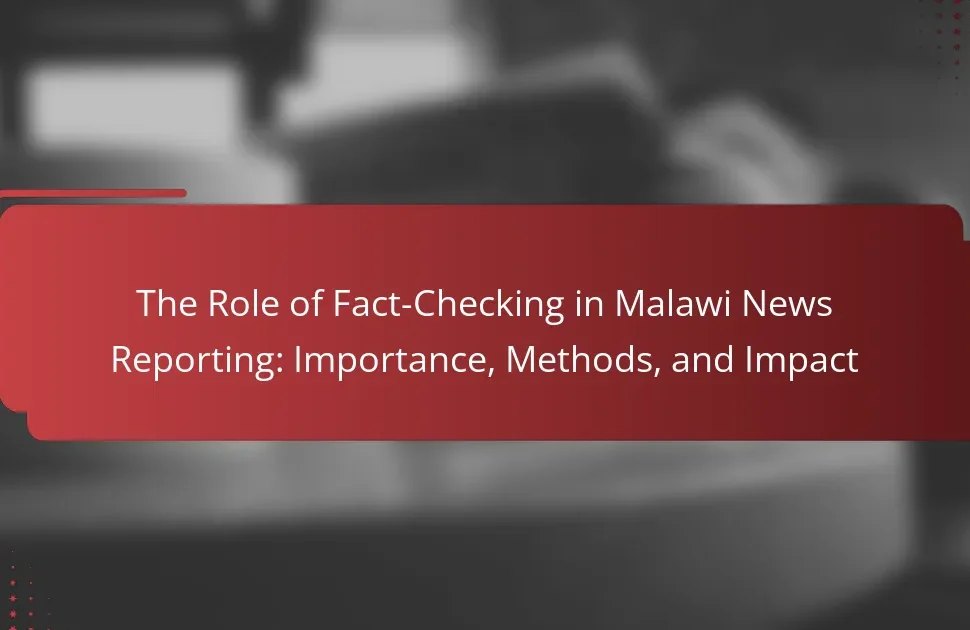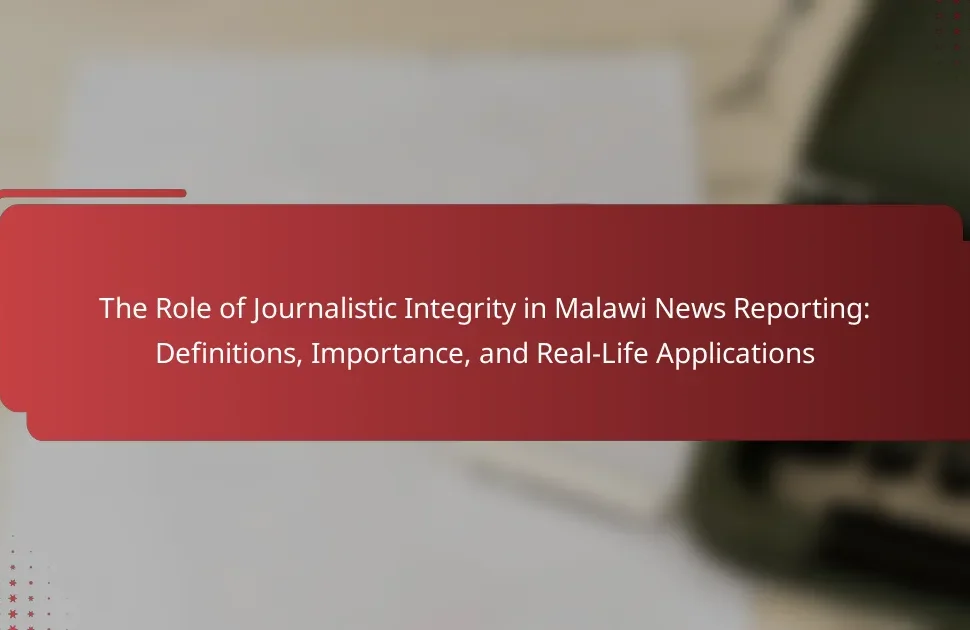Social media significantly impacts ethical reporting in Malawi by enhancing the speed of news dissemination and enabling citizen journalism. While it offers opportunities for diverse voices and real-time engagement, it also poses risks such as the rapid spread of misinformation and pressure on journalists to prioritize engagement over accuracy. The legal environment may not adequately protect journalists, increasing their vulnerability to harassment and threats. Additionally, a lack of media literacy among the public can exacerbate the effects of misleading information, threatening the integrity of ethical journalism. This article examines the trends, risks, and opportunities presented by social media in the context of ethical reporting in Malawi.
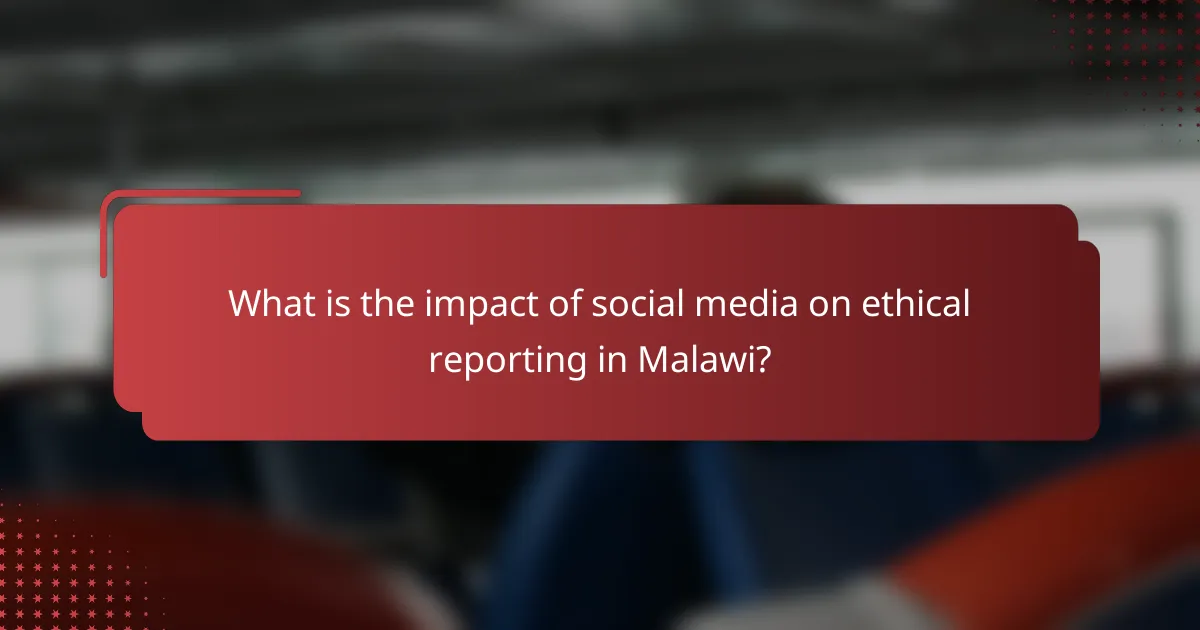
What is the impact of social media on ethical reporting in Malawi?
Social media significantly influences ethical reporting in Malawi. It enhances the speed of news dissemination, allowing journalists to share information rapidly. However, this immediacy can lead to the spread of misinformation. Journalists may face pressure to prioritize engagement over accuracy. The accessibility of social media empowers citizen journalism, which can challenge traditional media narratives. This democratization of information can promote accountability but also risks ethical breaches. Instances of unverified reports have been noted, leading to public distrust. Overall, social media presents both opportunities and challenges for ethical journalism in Malawi.
How has social media changed the landscape of journalism in Malawi?
Social media has significantly transformed journalism in Malawi by enabling faster news dissemination. Journalists now utilize platforms like Facebook and Twitter to share updates instantly. This shift has increased audience engagement and participation in news discussions. Social media also allows for diverse voices to be heard, including citizen journalism. However, it has introduced challenges such as misinformation and ethical dilemmas. The rise of social media has changed how news is sourced and verified. Traditional media outlets must adapt to maintain credibility in this new landscape. Overall, social media has reshaped the dynamics of information flow in Malawi’s journalism sector.
What are the key features of social media that influence reporting?
Key features of social media that influence reporting include immediacy, accessibility, interactivity, and user-generated content. Immediacy allows news to spread rapidly, often in real-time. Accessibility enables a wider audience to engage with news stories anytime, anywhere. Interactivity fosters dialogue between reporters and audiences, promoting engagement and feedback. User-generated content provides diverse perspectives and can challenge traditional narratives. According to a Pew Research Center study, 62% of adults get news from social media, highlighting its significant role in shaping public perception.
How do journalists in Malawi utilize social media for news dissemination?
Journalists in Malawi utilize social media primarily to share news quickly and engage with audiences. They post breaking news updates on platforms like Facebook and Twitter. This allows for real-time dissemination of information. Journalists also use social media to gather public opinions and feedback. They create polls and encourage discussions on important issues. Additionally, social media serves as a tool for networking with other journalists and sources. It helps in building relationships that can lead to exclusive stories. According to a 2021 report by the Media Institute of Southern Africa, 78% of Malawian journalists actively use social media for news purposes. This highlights its significance in the local media landscape.
What are the ethical considerations for reporters using social media in Malawi?
Reporters in Malawi face several ethical considerations when using social media. Accuracy is crucial; misinformation can spread rapidly online. Journalists must verify facts before sharing to maintain credibility. Privacy concerns are significant; sharing personal information without consent can lead to harm. Additionally, reporters should avoid conflicts of interest. They must disclose any affiliations that could bias their reporting. Ethical guidelines from organizations like the Malawi Chapter of the Media Institute of Southern Africa emphasize these responsibilities. Respecting cultural sensitivities is also vital. Content that may offend local customs should be approached with caution. Lastly, the potential for online harassment necessitates protective measures for journalists. These considerations are essential for responsible reporting in the digital age.
What challenges do journalists face in maintaining ethical standards?
Journalists face several challenges in maintaining ethical standards. These include pressure from media owners to prioritize sensationalism over accuracy. The rise of social media amplifies the spread of misinformation, making it difficult to verify facts. Journalists often encounter threats and harassment, which can compromise their ability to report freely. Additionally, limited resources and time constraints hinder thorough investigation. The demand for immediate news can lead to ethical lapses, such as inadequate fact-checking. In Malawi, these challenges are exacerbated by a lack of media literacy among the public, affecting how information is consumed and trusted.
How do social media platforms affect the credibility of news sources?
Social media platforms can diminish the credibility of news sources. They enable the rapid spread of misinformation and unverified content. This often leads to confusion among audiences regarding what is factual. A study by the Pew Research Center found that 64% of Americans believe fabricated news stories cause confusion. Additionally, algorithms prioritize engagement over accuracy, promoting sensationalist content. This can overshadow reputable journalism. Social media also allows anyone to publish information, blurring the lines between professional and amateur reporting. Consequently, traditional news organizations face challenges in maintaining trust.
What trends are emerging in social media use for ethical reporting in Malawi?
Emerging trends in social media use for ethical reporting in Malawi include increased engagement with local communities and a rise in citizen journalism. Journalists are utilizing platforms like Facebook and Twitter to share real-time updates on social issues. This practice enhances transparency and accountability in reporting. Furthermore, there is a growing emphasis on fact-checking and combating misinformation. Organizations are training journalists on ethical standards and responsible reporting. The use of multimedia content is also increasing, making stories more accessible and engaging. These trends reflect a shift towards more participatory and inclusive journalism in Malawi.
What role does citizen journalism play in shaping news narratives?
Citizen journalism significantly influences news narratives by providing alternative perspectives. It democratizes information dissemination, allowing individuals to report on events firsthand. This form of journalism often highlights stories overlooked by mainstream media. In Malawi, citizen journalists utilize social media to share local issues rapidly. Their contributions can shift public discourse and prompt official responses. Research shows that citizen journalism enhances accountability by exposing corruption. It fosters community engagement and empowers marginalized voices. Overall, citizen journalism plays a crucial role in diversifying news narratives and promoting transparency.
How are media organizations adapting to social media trends?
Media organizations are adapting to social media trends by integrating real-time reporting and audience engagement strategies. They are utilizing platforms like Twitter and Facebook for breaking news updates. This approach allows for immediate dissemination of information to a wider audience. Media organizations are also employing data analytics to understand audience preferences. By analyzing engagement metrics, they tailor content to meet the needs of their viewers. Additionally, many are collaborating with social media influencers to enhance reach and credibility. A study by the Pew Research Center in 2021 found that 53% of journalists reported using social media for story ideas. These adaptations demonstrate a shift towards a more interactive and responsive media landscape.
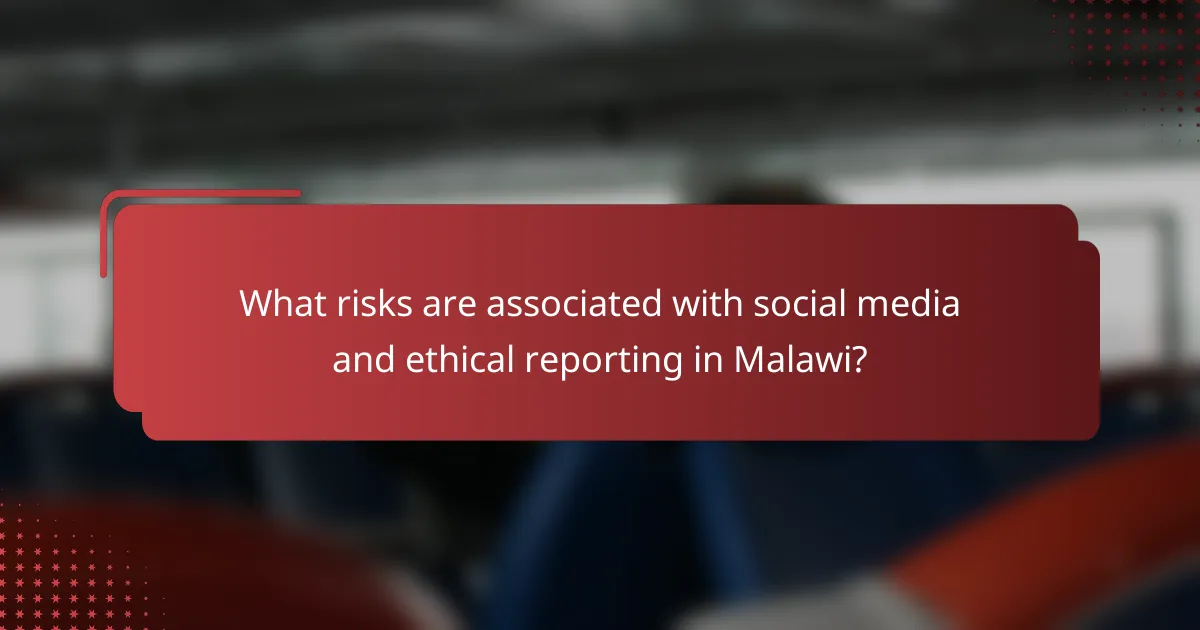
What risks are associated with social media and ethical reporting in Malawi?
Social media in Malawi poses several risks to ethical reporting. Misinformation can spread rapidly, leading to public confusion. Journalists may face pressure to publish unverified information to keep up with social media trends. This urgency can compromise the accuracy of news reporting. Additionally, there is a risk of harassment or threats against journalists who report critically. The legal environment in Malawi may not adequately protect reporters, increasing their vulnerability. A lack of media literacy among the public can exacerbate the impact of misleading information. These factors collectively threaten the integrity of ethical reporting in the country.
What are the potential dangers of misinformation on social media?
Misinformation on social media can lead to significant dangers. It can cause public panic and confusion. For example, false health information during a crisis can result in harmful behaviors. Misinformation can also undermine trust in credible sources. This leads to a misinformed public that struggles to discern fact from fiction. Additionally, misinformation can incite violence and hatred. Studies have shown that false narratives can escalate social tensions. In Malawi, misinformation can particularly impact ethical reporting and public perception. The spread of false information can hinder effective communication during critical events.
How does misinformation impact public perception of news?
Misinformation significantly distorts public perception of news. It leads to confusion about facts and events. When individuals encounter false information, they may form incorrect beliefs. This can create distrust in reliable news sources. A study by the Pew Research Center found that 64% of Americans believe misinformation has caused confusion about basic facts. Misinformation also amplifies polarization among audiences. People may gravitate toward news that aligns with their misinformation-driven beliefs. This results in an echo chamber effect, reinforcing false narratives. Ultimately, misinformation undermines informed public discourse and democratic processes.
What measures can journalists take to combat misinformation?
Journalists can combat misinformation by verifying facts before publication. They should cross-check information with credible sources. Using fact-checking tools can enhance accuracy. Journalists must maintain transparency with their audience. They should disclose sources and methods used in their reporting. Engaging with the audience can also help clarify misconceptions. Educating the public about misinformation is essential. Collaborating with fact-checking organizations strengthens their efforts. These measures are crucial in maintaining journalistic integrity and trust.
How does social media affect the safety of journalists in Malawi?
Social media significantly affects the safety of journalists in Malawi. It serves as both a platform for exposure and a tool for harassment. Journalists can share information widely, increasing their visibility. However, this visibility can attract threats from political figures and hostile groups. According to a report by the Committee to Protect Journalists, Malawian journalists face online harassment and intimidation. This creates a hostile environment that can deter reporting. Additionally, misinformation spread on social media can incite violence against journalists. The dual nature of social media thus poses both opportunities and risks for journalist safety in Malawi.
What threats do journalists face when reporting on sensitive topics?
Journalists face numerous threats when reporting on sensitive topics. These threats include physical violence, legal repercussions, and harassment. In many regions, journalists risk attacks from individuals or groups opposed to their reporting. Legal threats often arise from defamation laws or restrictive press regulations. Harassment can occur online or in person, impacting journalists’ mental health and safety. According to the Committee to Protect Journalists, 50 journalists were killed globally in 2020 while covering sensitive issues. Additionally, censorship can limit journalists’ ability to report freely. These threats create a challenging environment for ethical reporting, particularly in regions like Malawi.
How can journalists protect themselves while using social media?
Journalists can protect themselves while using social media by implementing strong security measures. They should use two-factor authentication on their accounts. This adds an extra layer of security against unauthorized access. Journalists must be cautious about sharing personal information. Revealing too much can make them vulnerable to harassment or doxxing.
They should also be aware of privacy settings on social media platforms. Adjusting these settings can help control who sees their content. Additionally, using pseudonyms for sensitive discussions can enhance their safety. Journalists should stay informed about the latest cybersecurity threats. Regularly updating passwords is also essential to maintain account security.
According to a report by the Committee to Protect Journalists, 53% of journalists have faced online harassment. This statistic highlights the importance of protective measures in the digital space.
What legal and regulatory challenges exist for social media reporting?
Legal and regulatory challenges for social media reporting include issues of data privacy, misinformation, and content moderation. Regulations like the Data Protection Act impose strict guidelines on handling user data. Social media platforms face scrutiny over their role in spreading false information. Governments may impose penalties for non-compliance with local laws. In Malawi, the Electronic Transactions and Cyber Security Act influences how social media is regulated. The lack of clear laws often leads to confusion among users and reporters. Additionally, the balance between free speech and regulatory compliance remains a contentious issue. These challenges can hinder ethical reporting practices on social media.
What laws govern social media use in journalism in Malawi?
In Malawi, the laws governing social media use in journalism include the Communications Act and the Cyber Security and Cyber Crimes Bill. The Communications Act regulates broadcasting and telecommunications, impacting how journalists use social media platforms. The Cyber Security and Cyber Crimes Bill addresses online conduct, including issues like defamation and privacy. These laws aim to ensure responsible use of social media in journalism while protecting citizens’ rights. Compliance with these regulations is essential for journalists to avoid legal repercussions.
How do these laws impact ethical reporting practices?
Laws significantly influence ethical reporting practices by establishing guidelines for accuracy and accountability. These regulations demand that journalists verify information before publication. They also protect sources, ensuring confidentiality in sensitive cases. Compliance with these laws fosters trust between the media and the public. Furthermore, legal frameworks discourage misinformation and promote responsible reporting. In Malawi, adherence to such laws can enhance the credibility of social media as a news source. Ultimately, these laws shape the standards by which ethical reporting is measured and practiced.
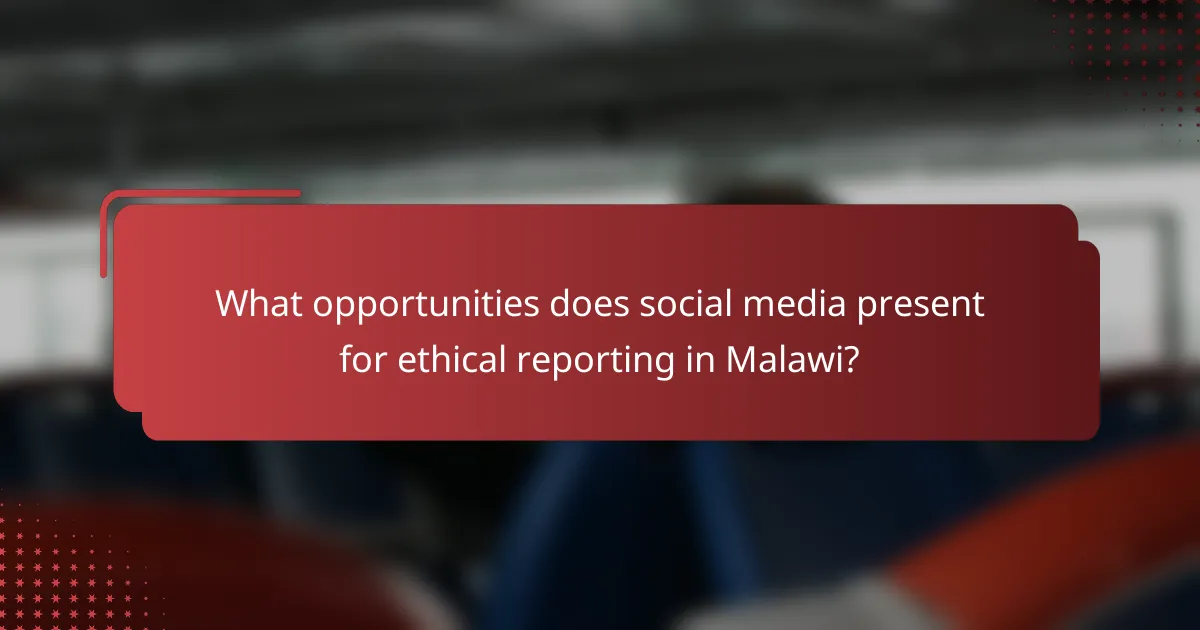
What opportunities does social media present for ethical reporting in Malawi?
Social media offers several opportunities for ethical reporting in Malawi. It enhances the speed of information dissemination. Journalists can share news instantly, reaching a broad audience quickly. Social media platforms allow for diverse voices to be heard. This inclusivity can lead to more balanced reporting. Additionally, it fosters direct engagement between reporters and the public. This interaction helps journalists gather real-time feedback and perspectives. Furthermore, social media can serve as a tool for fact-checking. Journalists can verify information through multiple sources shared online. Data from the Digital 2023 report indicates that 3.7 million Malawians use social media, highlighting its potential reach. Overall, these factors contribute to more transparent and accountable journalism in Malawi.
How can social media enhance audience engagement in reporting?
Social media enhances audience engagement in reporting by facilitating real-time interaction. It allows reporters to share updates instantly, increasing immediacy. Audiences can comment, share, and react to content, fostering a two-way communication channel. This interaction builds a sense of community among readers. Platforms like Twitter and Facebook enable journalists to gauge public interest and feedback. Research shows that stories shared on social media receive higher engagement rates. According to a Pew Research study, 62% of adults in Malawi use social media, highlighting its potential reach. Engaging with audiences through polls and questions can also drive participation.
What strategies can journalists use to foster community interaction?
Journalists can foster community interaction by utilizing social media platforms effectively. Engaging with the audience through comments and direct messages encourages dialogue. Hosting live Q&A sessions allows for real-time interaction and feedback. Creating polls and surveys helps gather community opinions on relevant issues. Sharing user-generated content fosters a sense of belonging and participation. Collaborating with local influencers can amplify reach and trust within the community. Reporting on local events and issues relevant to the community strengthens connections. Lastly, maintaining transparency and responding to community concerns builds credibility and trust. These strategies enhance community engagement and improve the quality of reporting.
How can feedback from social media improve reporting quality?
Feedback from social media can enhance reporting quality by providing real-time audience insights. Journalists can gauge public reactions to stories and adjust their narratives accordingly. This feedback loop fosters greater accountability in reporting. It encourages reporters to address inaccuracies and clarify misunderstandings. Social media platforms can also highlight underreported issues based on user discussions. By analyzing trends in feedback, journalists can identify topics of high public interest. This leads to more relevant and engaging content. Research shows that responsive reporting improves audience trust and satisfaction.
What role does social media play in promoting transparency and accountability?
Social media serves as a platform for fostering transparency and accountability. It enables real-time information sharing among individuals and organizations. Users can easily access and disseminate information about governance, policies, and corporate practices. This visibility encourages public scrutiny of actions taken by authorities and institutions. For instance, social media campaigns have successfully highlighted corruption cases, prompting investigations and reforms. A study by the Pew Research Center found that 64% of social media users believe these platforms help hold leaders accountable. Thus, social media acts as a catalyst for civic engagement and oversight, reinforcing ethical standards in reporting and governance.
How can social media be used to hold power to account?
Social media can be used to hold power to account by providing a platform for transparency and public discourse. It enables citizens to share information rapidly and widely. This information can reveal abuses of power or corruption. For instance, in Malawi, social media has facilitated the exposure of government mismanagement. Activists have used platforms like Facebook and Twitter to mobilize public opinion. This mobilization can lead to protests or demands for accountability. Furthermore, social media allows for real-time reporting of events. This immediacy can pressure authorities to respond to public concerns. Overall, social media acts as a tool for empowerment and oversight in governance.
What examples exist of successful accountability campaigns in Malawi?
Successful accountability campaigns in Malawi include the “Malawi Governance Accountability Program” and “Citizen Action for Justice.” The Malawi Governance Accountability Program aimed to enhance transparency in government spending. It utilized social media to mobilize citizens and raise awareness about public resources. The campaign led to increased public participation in budget discussions.
Citizen Action for Justice focused on holding local leaders accountable for service delivery. It engaged communities through social media platforms. This campaign resulted in improved responsiveness from local authorities. Both campaigns demonstrate effective use of social media for accountability in Malawi.
What best practices should journalists follow when using social media for reporting?
Journalists should verify information before sharing it on social media. Fact-checking helps prevent the spread of misinformation. They should attribute sources clearly to maintain transparency. Crediting original content builds trust with the audience. Engaging with followers respectfully fosters community interaction. Responding to questions and feedback shows accountability. Maintaining professionalism in tone and language is essential. Avoiding sensationalism ensures ethical reporting practices. These practices align with journalistic standards and enhance credibility.
How can journalists ensure their social media content is ethical and accurate?
Journalists can ensure their social media content is ethical and accurate by adhering to established journalistic standards. They should verify information through multiple credible sources before posting. Fact-checking is essential to avoid spreading misinformation. Transparency about sources and methods enhances credibility. Journalists must disclose conflicts of interest to maintain trust. Engaging with audiences responsibly fosters ethical dialogue. Continuous education on ethical standards is crucial in the evolving social media landscape. The Society of Professional Journalists emphasizes these principles in their Code of Ethics, highlighting the importance of accuracy and accountability.
What tools and resources are available to support ethical social media reporting?
Various tools and resources support ethical social media reporting. Fact-checking organizations like Snopes and FactCheck.org provide verification services. Social media platforms, such as Twitter and Facebook, offer guidelines and resources for responsible reporting. Training programs from organizations like the International Center for Journalists (ICFJ) focus on ethical journalism practices. Additionally, tools like Media Bias/Fact Check help assess the reliability of sources. Online courses on platforms like Coursera and edX cover ethical reporting standards. Resources from journalism associations, such as the Society of Professional Journalists, outline ethical codes. These tools collectively enhance the integrity of social media reporting.
The main entity of the article is the impact of social media on ethical reporting in Malawi. The article examines how social media influences the speed of news dissemination, enhances citizen journalism, and presents both opportunities and challenges for journalists in maintaining ethical standards. Key topics include the ethical considerations journalists face, the effects of misinformation on public perception, and emerging trends in social media use for accountability. Additionally, the article discusses the legal and regulatory challenges that affect social media reporting and highlights best practices for journalists to ensure accuracy and ethical engagement.
